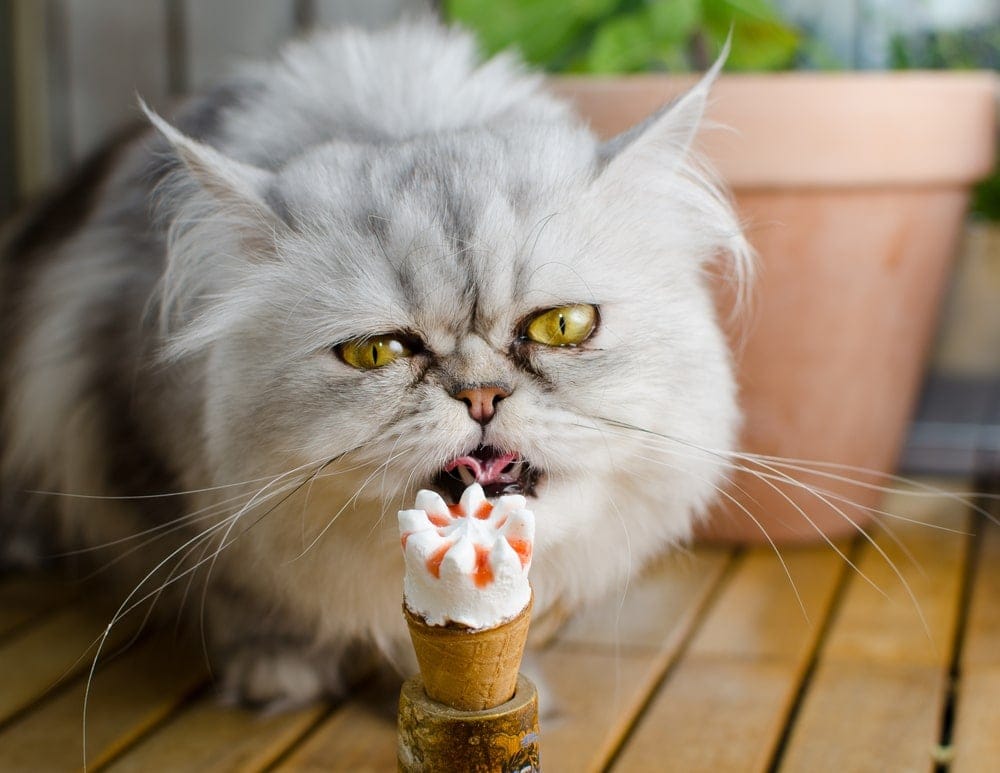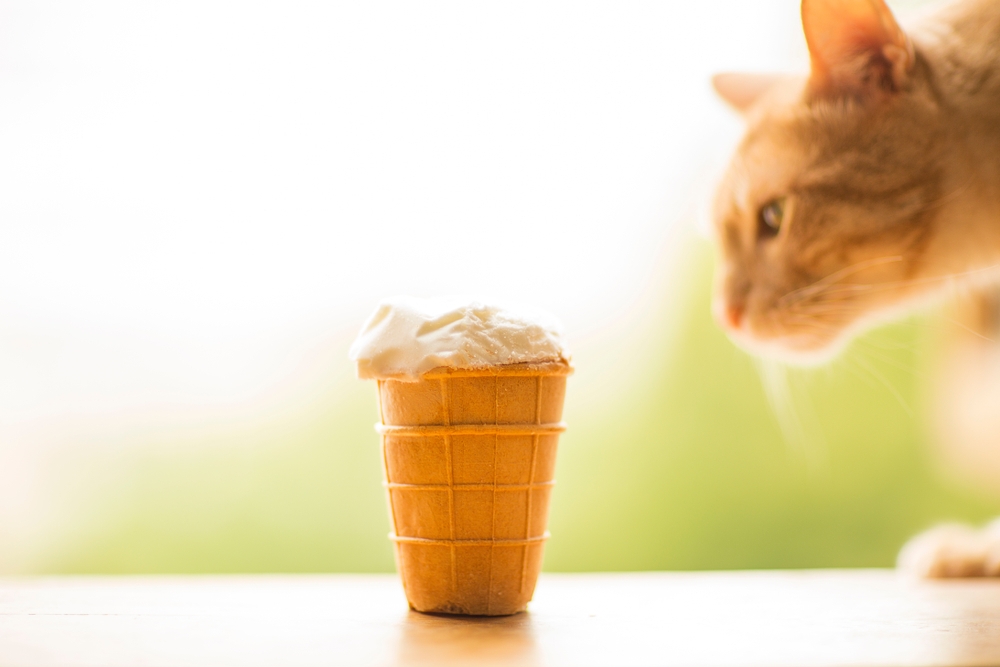When the weather is hot like it is in the summer, cat owners might want to give their cats a scoop of tasty vanilla ice cream. A lot of people think that cats love drinking milk, so why would they not like ice cream? Vanilla ice cream doesn’t have any harmful ingredients for your cat, but it’s also not a healthy treat, so you shouldn’t give it to them.
Let’s dig a little deeper into can cats eat vanilla ice cream. Here’s everything you need to know about your cat and vanilla ice cream.
Ice cream is one of life’s simple pleasures. On a hot summer day, few things beat a cool, creamy scoop of your favorite flavor. As a cat owner, you may be tempted to share a bit of your frozen treat with your feline friend. But is it safe for cats to eat vanilla bean ice cream? Let’s dig into this icy dilemma.
The Appeal of Ice Cream for Cats
It’s easy to understand why cats may beg for a taste of ice cream. With its cold, smooth, sweet texture and tantalizing aroma, ice cream seems appealing to both humans and animals. The rise in popularity of cat-friendly ice creams made with safe ingredients for felines shows that cats enjoy frozen desserts too.
So if your cat eyes your bowl of vanilla bean ice cream, they probably just want to join in the treat. It’s a natural response. But resisting those pleading eyes is best for your cat’s health.
Dangers of Ice Cream for Cats
While ice cream may look harmless, it poses several risks for cats:
-
Sugar – Ice cream is high in sugar, from ingredients like sugar, corn syrup, or artificial sweeteners. Too much sugar is unhealthy for cats, who are obligate carnivores not designed to digest large amounts of carbs or sugars. It can lead to obesity, diabetes, and dental issues.
-
Lactose – Most cats are lactose intolerant, meaning they lack the enzymes to properly digest dairy. The lactose in ice cream could cause digestive upset like vomiting, diarrhea, gas, or bloating.
-
Fat – The high fat content of ice cream, especially premium styles like vanilla bean, can lead to pancreatitis, an inflammatory condition that requires emergency vet treatment.
-
Flavorings – Added flavors like vanilla extract may seem safe, but could irritate a cat’s stomach. Chocolate ice cream is toxic to cats
-
Temperature – Eating something frozen quickly may temporarily damage a cat’s sensitive teeth and mouth
-
Unbalanced diet – Dairy like ice cream offers little nutritional value for cats, who need a meat-based diet Too many treats can lead to malnutrition
So while a small lick of ice cream likely won’t harm your cat, regular consumption could put your cat’s health at risk. It’s best to avoid sharing this human dessert.
Healthier Treats for Cats
Instead of ice cream, reward your cat with small amounts of treats formulated just for them, including:
- Canned or dehydrated salmon, tuna, chicken or beef
- Commercial cat treats (look for natural options without additives)
- Plain cooked chicken or fish (no salt, spices, oil, or bones)
- Plain boiled eggs or egg whites
- Low-fat cottage cheese or plain yogurt (limit due to lactose)
- Veggies like steamed carrot or green bean pieces
- Unsweetened whipped cream (in very small portions)
For a longer lasting treat, offer safe chews like rawhide-free chew sticks. Or try feeding meals through a food puzzle toy to keep your cat entertained and exercised.
With so many cat treat options available, say no to sharing your ice cream. Protect your cat’s health while still spoiling them.
Can Cats Have Cat-Friendly Ice Cream?
Recently, ice creams formulated specifically for cats have become available. Brands like Meowijuana and Puss Creamery create cat ice creams using feline-safe ingredients like chicken or fish broth, coconut milk, and cat grass powder.
These products can let your cat enjoy the cold, creamy experience of ice cream without the dangers. But even these should only be fed occasionally in tiny amounts. Too much could still upset your cat’s stomach or lead to weight gain. Check with your vet before introducing any new food.
Homemade cat ice cream recipes also circulate online using plain yogurt and cat food. These may be safer than traditional ice cream, but improper preparation could allow bacteria to grow. It’s usually best to stick to commercial cat ice creams and monitor your cat closely for any adverse reaction.
Signs of Illness from Ice Cream
Though a small taste is unlikely to hurt, be alert for these signs of illness if your cat manages to gulp down a bowl of ice cream:
- Vomiting or diarrhea
- Lethargy, weakness, or trembling
- Loss of appetite
- Increased thirst or urination
- Drooling
- Abdominal pain or bloating
Cats can develop a life-threatening condition called adversive status glycemicus from too much sugar. Symptoms requiring emergency vet care include uncoordinated walking, collapsing, seizures, coma, or death. Seek immediate vet help if your cat eats a large amount of ice cream and shows any odd behavior.
The Bottom Line
So can cats have vanilla bean ice cream? Technically, yes – but they really shouldn’t. While a tiny lick likely won’t cause harm, ice cream provides no health benefits for cats. The sugar, dairy, fat, and flavorings pose serious digestion issues. Stick to treats made just for cats instead. That way, you can enjoy your frozen treat without worrying about your cat’s health. With so many cat-safe alternatives, there’s no need to share your ice cream with your feline friend.

Is Vanilla Ice Cream Safe for Cats?
Even though vanilla ice cream usually doesn’t have any ingredients that are bad for cats, you should never give them vanilla ice cream. In moderation, your cat should be fine licking ice cream from an empty bowl or the ground. However, if your cat eats too much, it could become very sick and vomit or have diarrhea.
Vanilla ice cream may contain artificial sweeteners instead of sugar. One kind of sweetener is very bad for dogs, and while it hasn’t been fully proven to be bad for cats, it’s still best to stay away from it at all costs. The good news is that a sweet-tasting treat won’t be a huge temptation for your kitty. In fact, felines lack the ability to taste sweet favors and, therefore, will not appreciate sweet-tasting ice cream. If there is any chocolate ice cream mixed in with the vanilla, avoid offering it to your cat. Any type of chocolate is poisonous to cats and may be fatal.
Moreover, most cats are lactose intolerant, and this is another reason to avoid feeding them ice cream. Just like humans, some cats aren’t able to properly digest the lactose found in dairy products.
Why Do Cats Like Vanilla Ice Cream?
While cats can’t taste sweetness, some may still love vanilla ice cream. They might be drawn to dairy products like vanilla ice cream and whole milk, which have a lot of carbs and fat.

What Happens When A Cat Eats Vanilla Ice Cream ? Find Out ! #petnutritionplanet #cats
FAQ
Can cats lick vanilla bean ice cream?
Is vanilla bean safe for cats?
Can I give my cat a lick of ice cream?
Can we give vanilla ice cream to cats?
